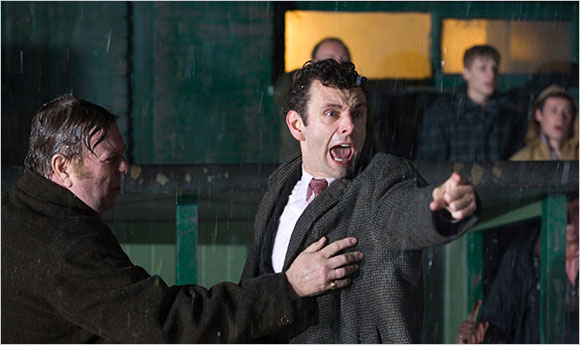The Damned United

In March of 1961, Leeds United Association Football Club hired former center forward Don Revie (played by Colm Meaney in the film) as player-manager. By the 1963-64 season, Revie’s leadership took the football (“soccer” stateside) team to First Division. From 1965 to 1974, the team never finished outside of fourth place. After two League Championships and several other cup wins, Revie left to manage the English national team. His successor, Brian Clough (Michael Sheen), an outspoken critic of Don Revie, was ousted in just 44 days. This film tells the story of Clough’s arduous rise to the post, and his abrupt fall.
“Football is a beautiful game… It needs to be played beautifully,” insists Clough to the club players. Clough was, by most accounts, self-destructive in his manner. “They wouldn’t have played football that way if they were happy,” he remits on a Yorkshire Television interview. The appearance draws the ire of United AFC Board chairman Sam Longson (Jim Broadbent).
From here the clock rewinds to 1968, when Clough was managing Derby County—second from bottom in the Second Division in which they had played for ten years prior. They operate from a tattered office, in dire financial straits, a major hindrance when Clough signs goalkeeper Colin Boulton (for £170,000). Under Clough, however, Leeds United moves up the ladder to the top slot in Second Division, eventually ascending to First Division.
The film has three major subplots. One is the rivalry between Clough and Revie. Another is the relationship between Clough and his scout and close friend, Peter Taylor (Timothy Spall). Finally, there’s Clough’s internal struggle with his self-defeating demeanor.
As Peter Taylor, Mr. Spall reprises his weathered yet witty right-hand man type, “You know, it’s illegal to sign someone on the Sabbath,” he says just as they’re attempting to sign Dave Mackay (Brian McCardie).
It’s a welcome distraction. There’s so much that comes apart at the seams in Clough’s career that Taylor provides an uplift to a dreary biography. The film intercuts between the past and the present, contrasting Clough’s successes at Derby with his failures at Leeds. The footballers at Leeds play dirty and rough. Clough stands in the shadow of Don Revie, unable to get the players behind him. Their differing approaches to management—Revie documented and dissected every play of the opposition during the season—threw several players into a fit, culminating finally in his dismissal.
“The enemy isn’t Lawson. It’s Revie and his obsession with Leeds,” says Pete. The genesis of Clough’s hatred for Revie, as the film tells it, is ludicrous in retrospect. It was, however, enough to set Clough on a rampage destroying with his mouth everything in his path, including himself.
The Damned United is an intriguing study in human ego, and its ability to interfere with sound management. The story is a second cousin to our own breakdowns of corporate governance in America. In stark contrast to the vermillion, ochre and brown hues of the period (my pathological aversion to these colors immediately triggers recall of economically-bleak times), two key scenes bathed in blues show a nearly-frightened Clough. Hatred for an iconic predecessor got him here, but it isn’t the substance that assures victory.
What the film lacks may be more character depth on the periphery. We spend too much time watching the standard montages of typical sports films, ticking off the steps toward victory. However, director Tom Hooper and writer Peter Morgan (The Queen, Frost/Nixon) avoid the “path to glory” plot cliché. In the making of a hero, origins are invariably more interesting than conclusions. Paced slowly with a restrained tone toward the beginning, this contrasts well with the ascendance and subsequent unraveling of Clough’s career. The film tells us not how Brian Clough came to succeed as manager of Nottingham Forest AFC, but how he first failed with Leeds. Behind every successful man is a string of failures from which he has emerged.
 The Damned United • Dolby® Digital surround sound in select theatres • Aspect Ratio: 1.85:1 • Running Time: 97 minutes • MPAA Rating: R for language. • Distributed by Sony Pictures Classics
The Damned United • Dolby® Digital surround sound in select theatres • Aspect Ratio: 1.85:1 • Running Time: 97 minutes • MPAA Rating: R for language. • Distributed by Sony Pictures Classics